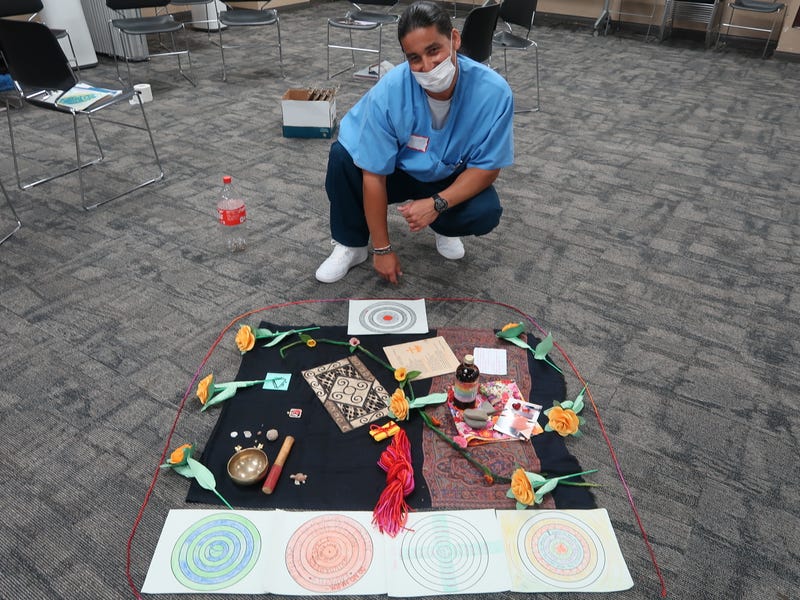
Editor's note: Crime in the Bay Area, and around California, has attracted national attention in recent months.
San Francisco's recall of former District Attorney Chesa Boudin shined a spotlight on the debate about how to increase community safety, prevent criminals from reoffending and protect victims.
In this series of special reports, KCBS Radio will examine the innovative approach of an East Bay nonprofit called the Ahimsa Collective.
In Part 5, we hear how rehabilitative programs helped one man who spent decades in prison.
Warning: References to violence in these stories might be upsetting to some readers.
For more, stream KCBS Radio now.
SOLEDAD, Calif. (KCBS RADIO) – The Ahimsa Collective's Empathize program sessions inside Soledad State Prison start with a check-in, offering everyone a chance to say hello and share a few words about how they are feeling.
"Good morning, everybody," one man began during KCBS Radio's visit. "I'm really excited to be here. I'm feeling a little ill. I just had ear surgery a couple days ago, so I'll be in pain most of the day. I'm trying to work through it."
"Emotionally, I’m a little all over the place right now," he added.
The check-in might seem like a small act, but many of the incarcerated men in this group spent lifetimes ignoring or suppressing any emotions.
Tapping into those emotions is at the heart of the work of empathizing with survivors of crime and writing apology letters to people the men have harmed.
One session culminated with a pledge of nonviolence.
The crime survivors and Ahimsa Collective came up with a set of words for the group to say together. Then, in smaller sessions, the men brainstormed personal pledges that they could add.
Among the personal pledges:
"I pledge to treat my fellow human beings with dignity and respect at all times."
"I pledge to stay away from gangs and gang activity."
"I pledge to do no harm to myself nor to others."
Back in the Bay Area, Craig, whose real name we are not using because of the nature of his crimes, agreed to share his story with KCBS Radio at Oakland's Lake Merritt.
"I was a very violent person," he told KCBS Radio. "I committed a gang-related murder. And I also sexually assaulted women. Something I really feel horrible about all the way around today as I sit here before you."
He was sentenced to 36 years to life in prison when he was about 20 years old. After serving 36 years, he was found suitable for parole and released in April.
"I know that I will never harm another person again – like intentionally," he said.
Craig explained he can hold that promise because he finally started looking at why he committed the harm in the first place
"What led me to the point where I was able to commit a heinous act of rape? Right? You can't leave out the fact that I was sexually abused as a 6-year-old kid," he said.
Craig was sexually abused multiple times by different people until he was 12. He kept it all to himself until he was in his mid-40s.
"I didn't tell anybody about that until, like, 2012 when I got to San Quentin State Prison," he said. "And I was able to do the work."
He said he would not have had access to the opportunity to do that work if he weren't incarcerated.
"It wasn't required for me to do any of those programs. That was something that I wanted to do on my own," he explained. "However, you have some people in those prisons who just serve their time, and they don't have to go to no group and they’ll be released back out into society. Period."
"Those are the people that I would say that you should be concerned about," he added. "Because they haven't had an opportunity to work through the shame."
"Working through the shame" is exactly what the Empathize Program is trying to do inside Soledad State Prison.
Talking about their letters in a small group workshop, one man questioned whether it is fair to even have the chance to apologize after he caused so much harm. He said he felt "hypocritical."
"I want to just, like, put the nails in the coffin for a little bit and go away until my victims feel that I've paid the price," he said, wiping away tears.
Craig said that for him, the change began when he started examining the harm he had experienced.
"Once I had an opportunity to address my own sexual trauma, I was able to climb out of that hole and began look at what I had done to others," he said. "I had to have empathy for myself before I could have empathy for others."
He wrote apology letters to all of the people he harmed.
"And doing that, I'm telling you, it was the most difficult process for me out of all the work that I have done because it required me to put myself in the survivors' shoes," he said.
Those survivors are not registered with the California Department of Corrections and Rehabilitation's Office of Victim and Survivor Rights and Services, which is the case for the majority of survivors.
So, Craig said he does not know if they will ever receive those letters or if they will even want to read them if they do.
"And it's not about forgiveness," he said. "Like, in doing this work that I’m doing, I'm not looking for forgiveness. I don't want to impose forgiveness on anyone. That's a decision that the survivor has to make if that's something they want to do. To me, ultimately, I would love for it to be about healing."
Special Reports from Soledad State Prison
PART 1 | PART 2 | PART 3 | PART 4 | PART 5
DOWNLOAD the Audacy App
SIGN UP and follow KCBS Radio
Facebook | Twitter | Instagram

